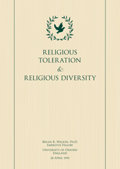The range of religious variation to which principles of toleration and nondiscrimination were extended was initially quite narrow, embracing only a limited number of Christian denominations and, less equitably, the Jews. The conception of what constituted a religion was premised on this variety of Judaeo-Christian movements. Religion as such was conceived as being virtually synonymous with Christianity, and the experts in religion were theologians who were themselves committed Christians. It was they who traditionally provided the definitions of what constituted religion, and their concepts were inevitably cast in exclusively Christian terms. Theologians’ definitions of religion may be regarded as largely academic, but they have their influence in other more practical spheres, not least in courts of law, sometimes with very unjust results. For example, the absurd result obtained from a legally-adopted narrow, culture-bound definition of religion may be instanced by a case in England as late as 1754, when a judge, Lord Hardwicke, ruled that, although religion was a charitable object, the teaching of Judaism was not, and he ruled that the funds left by a testator for instruction in Judaism should be applied instead to the provision of instruction in Christianity. For the courts at that time, the term “religion” did not include Judaism: it meant only Christianity.
IV. Culture-Boundedness in the
Definition of Religion

Scientology, Social Science and the Definition of Religion
by James A. Beckford, Professor of Sociology, University of Warwick, England

Social Change and New Religious Movements
by Bryan R. Wilson,
Emeritus Fellow in Sociology, Oxford University

The Church of Scientology
by Juha Pentikäinen, Marja Pentikäinen, University of Helsinki, Finland

The Relationship Between Scientology and Other Religions
by Fumio Sawada, Eighth holder of the secrets of Yu-itsu Shinto, the oldest religion in Japan; President, Ahlul-Bait Center

The Religious Nature of Scientology
by Geoffrey Parrinder, Methodist minister, Professor, Comparative Study of Religions, University of London

Religious Philosophy, Religion and Church
by G.C. Oosthuizen, Professor of Science of Religion, University of Durban-Westville, Natal, South Africa

Scientology a New Religion
by M. Darrol Bryant, Department of Religious Studies, Renison College, University of Waterloo, Ontario, Canada

Apostates and New Religious Movements
by Bryan R. Wilson,
Emeritus Fellow in Sociology, Oxford University

Scientology: An Analysis and Comparison of its Religious Systems and Doctrines
by Bryan R. Wilson,
Emeritus Fellow in Sociology, Oxford University

The Reliability of Apostate Testimony About New Religious Movements
by Lonnie D. Kliever Ph.D., Professor of Religious Studies

The Sea Organization and its Role Within the Church of Scientology
by Frank K. Flinn Ph.D. Adjunct Professor in Religious Studies

Brief Analyses of the Religious Nature of Scientology
by J. Gordon Melton, Baylor University, Samuel Hill, Gary Bouma, Irving Hexham

Congregational Services of the Church of Scientology
by Bryan R. Wilson,
Emeritus Fellow in Sociology, Oxford University

Is Scientology A Religion?
by Alan W. Black, Associate Professor of Sociology, University of New England, Armidale, New South Wales, Australia

Is Scientology a Religion?
by Dean M. Kelley, National Council of Churches

Religious Toleration & Religious Diversity
by Bryan R. Wilson,
Emeritus Fellow in Sociology, Oxford University

Scientology A Religion In South Africa
by David Chidester, Professor of Comparative Religion, University of Cape Town, South Africa

Scientology: A True Religion
by Urbano Alonso Galan, Professor of Philosophy and Theology, Gregorian University of Rome

Scientology: A Way of Spiritual Self-Identification
by Michael Sivertsev, Moscow Academy of Sciences

Scientology: A Worshipping Community
by Lonnie D. Kliever, Southern Methodist University, Dallas, Texas

Scientology and Contemporary Definitions of Religion in the Social Sciences
by Alejandro Frigerio, Professor of Sociology, Catholic University of Argentina, Buenos Aires

Scientology and Islam an Analogous Study
by Fumio Sawada, Eighth holder of the secrets of Yu-itsu Shinto, the oldest religion in Japan; President, Ahlul-Bait Center

Scientology and Religion
by Christiaan Vonck, Rector, Faculty for Comparative Study of Religion, Antwerp, Belgium

Scientology: A Comparison with Religions of the East and West
by Per-Arne Berglie, Professor of History of Religion, University of Stockholm

Scientology Its Cosmology, Anthropology, System of Ethics and Methodologies
by Régis Dericquebourg, Professor of Sociology of Religion, University of Lille III, France

Scientology – Its Historical-Morphological Frame
by Dario Sabbatucci, Professor of History of Religions, University of Rome

Scientology: Its True Nature
by Harri Heino, Professor of Theology, University of Tampere, Finland

Scientology: The Marks of Religion
by Frank K. Flinn, Adjunct Professor of Religious Studies Washington University

